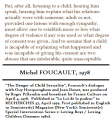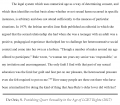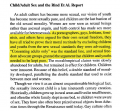One of our staff members is contributing considerably to a News Archiving service at Mu. Any well educated (Masters, PhD or above) users who wish to make comments on news sites, please contact Jim Burton directly rather than using this list, and we can work on maximising view count.
Debate Guide: Childhood innocence

There are many arguments related to childhood sexual innocence, since it is a subjective concept. Innocence is a romantic term for naivety or ignorance. The opposite of ignorance is experience or knowledge, which contributes to growth and intelligence.
While innocence in its purest form (absence of sexuality in women and children - Victorianist Puritanism) is rejected by most modern child advocates, the "safeguarding" of "children" and "childhood" is how this myth survives. Nevertheless, the arguments addressed here are more likely to be found on American Christian bulletin boards than Science or Rationalism sites.
An "institution" of "oughts"?
Childhood is a special time, innocent and uncorrupted by adult emotions such as sexuality. Children do not understand the corruption of adulthood, and require special moral protection, as does our institution of childhood.
This is actually quite the antithesis of "let children be children", when one looks at the evidence throughout history. If a subjective, romanticized, postindustrial western vision of childhood must take precedence, we are perpetuating cyclical paternalism, not letting children be children.
Take it from David Evans[1], Richard Yuill's supervisor:
- "Cross-cultural and historical evidence demonstrates clearly that the customary separation of childhood and sexuality and the protraction of childhood well beyond adolescence is socially constructed, despite normative justifications expressed in absolute terms of "God"-given natural, physical and emotional maturation. As the data collated by Ford and Beach (1951) demonstrated, even in the most "primitive" and restrictive societies, some children engage in secret sex play, and where cultural values are less restrictive, children freely engage in various sexual practices, in some instances beginning coitus by the age of 6-8, with few virgins amongst those over the age of 10-11. Historians have presented extensive evidence that protracted innocent childhood is a relatively modern construct within Judaeo-Christian culture (Aries 1962; De Mause 1979; Hunt 1970; Currier 1981; Franklin 1986; Plumb 1972; Boas 1988). Most famously, Aries has argued that within the sociability of pre-capitalism, children were integral participants in adult life: "as soon as the child could live without the constant solicitude of his mother, his nanny, or his cradle-rocker, he belonged to adult society (Aries 1962: 331), likewise, "by the age of ten, girls were already little women" (Aries 1962: 332)."
Sexual contact as "theft" argument
The theft of a child's innocence (molestation) is an unforgivable crime.
This argument relies on the vague assumption that for minors, voluntary sex automatically leads to complicated emotional reactions in the first place. It is also based on the assertion that "innocence" and "purity" are somehow the opposites of sexual experience, i.e. sex cannot be "pure" or "innocent". These are just outdated quasi-religious beliefs, and have no grounding in objective reality. Similar beliefs in relation to women (grounded in the father or husband's ownership of her virtue) have already been thoroughly discredited to the point of ridicule.
Excerpt Graphic Library
These graphics, some of which apply directly to the argument at hand, may be useful when presenting research in character-limited online debates. Simply save and share them.
-
Philip Jenkins on "objective" scientific terminology throughout time
-
Gilbert Herdt on the glib reductionism of "pedophile" taxon
-
Chenier - how the "pedophile" concept services mainstream society
-
Ning de Coninck-Smith[2] on the functions of pedophile-hating
-
Gayle Rubin, in Thinking Sex
-
Foucault, 1978, philosophical take on consent
-
A Percy Foundation reviewer on Chloë Taylor, and the concept of an "Ideal Victim" who is permitted to speak
-
What Foucault had to say about identity
-
Thorstad on the modern gay movement and undesirability of assimilationism[3]
-
Thorstad (same article) on similar trends in the modern gay movement
-
De Orio on pressures facing the LGBT Movement
-
De Orio on Queer Identities that don't fit the model of consent
-
De Orio with some observations about the role of Liberals in Sex Offender Panic
-
David M. Halperin warns against "Queer" essentialism in "Saint Foucault: Towards a Gay Hagiography"
-
Harris Mirkin on "consenting adults only" trope among other sexual minorities
-
David Evans on the fragile modern construct of childhood innocence and contrary examples
-
David Evans - further details the cultural underpinnings of childhood innocence
-
David Evans - more on the underpinnings of childhood innocence
-
James Kincaid: Erotic Innocence
-
Egan and Hawkes - Agency
-
Sex Offender Law Exceptionalism, and a possible reason for it
-
Kinsey is quoted on Sex Offender Exceptionalism in this meme, plus his philosophy on child trauma
-
Rene Guyon (1951) on the curious exceptionalism of sex laws
See also
Useful literature reviews:
External links
- Children Are Innocent - TVTropes
- Is–ought problem - Proponents of this argument may also show a general inability to distinguish is from ought statements.



![Ning de Coninck-Smith[2] on the functions of pedophile-hating](/wiki/images/thumb/FLCYK57XwAI5rBj.png/120px-FLCYK57XwAI5rBj.png)




![Thorstad on the modern gay movement and undesirability of assimilationism[3]](/wiki/images/thumb/20210920_033904.jpg/120px-20210920_033904.jpg)











